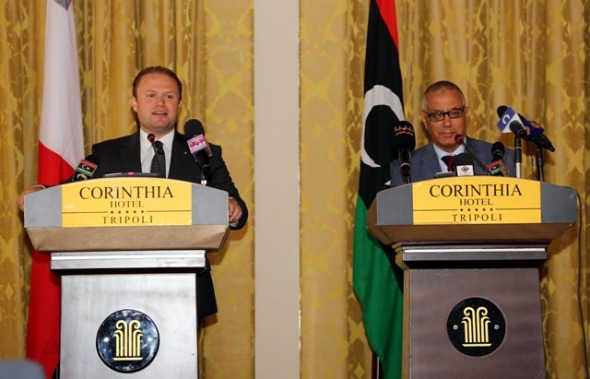By Michel Cousins.

Tripoli, 23 June 2013:
Libya intends to provide Malta with oil and hydrocrabon products, according to the Prime Minister. Speaking . . .[restrict]at a press conference early this afternoon following talks with his Maltese counterpart, Joseph Muscat, who flew in talks this morning, Ali Zeidan said that Libya was “ready to offer the amount Malta needs”. However, details still had to be worked out before an agreement could be made, he said.
The implication is that Libya will provide Malta with guaranteed supplies at fixed prices, as it has done with Egypt and Tunisia. At present, Malta, like other countries, has no problems buying oil but has to do so at international market rates.
Malta is also known to be looking for assured gas supplies to fuel its power station as well as seeking a resolution on a disputed offshore area thought to contain hydrocarbon reserves but also claimed by Libya.
For his part, Muscat who was accompanied by his Energy Minister, Konrad Mizzi, as well as by his Home, Foreign and Tourism Ministers, said he did not want to go into specific details of what had been discussed on energy. He did add, however, he was “looking first to buy oil and products”. The plan was “an agreement to collaborate much more on energy”. He was “confident”, he said, that it would happen. A start “had been made” today, he said.
Muscat arrived at Mitiga Airbase early in the morning accompanied by Home (Interior) and National Security Minister Emanuel Mallia, Foreign Minister George Vella, Tourism Minister Karmenu Vella and the Energy Minister. After a closed session, the two premiers were joined by the Maltese ministers and their opposite Libyan numbers – Interior Minister Mohamed Al-Sheikh, Foreign Minister Mohamed Abdulaziz, Oil Minister Abdulbari Al-Arusi and in the case of the Tourism Ministry, the Undersecretary, Abdulsamea Mahboub, the Tourism Minister being abroad. The ministers then held separate one-on-one talks.
Oil was far from the only issue on the prime ministerial table. “We discussed economic affairs, investment and security”, said Zeidan. Talks also covered Libyan funds frozen in Maltese banks, as well as visas, illegal immigration and both countries’ security.
They additionally centred in part of Muscat’s hopes for a different relationship with Libya. Muscat had “presented a new vision of relations between the two countries”, said Zeidan.
Muscat spelled out that vision when he was interviewed by the Libya Herald in April. He said at the time he was looking to a new partnership of equals with Libya in which the two countries worked as friends, helping each other.
In relation to investment, Zeidan said today that it had been agreed that particular sectors of the Libyan economy would be open to Maltese companies. He specified tourism, investment and the constriuction sector, but there was no explanation as what exactly was going to be offered to Maltese firms. Malta would be open to Libya private sector companies, he added, although this is already the case. “Maltese investors are welcome here”, he said.
On the thorny visa issue, Zeidan said that Muscat had offered to put in place a new system under which Libyans would be able to secure visas for Malta “far easier than for other countries” and that the Maltese Prime Minister had stressed Malta’s desire for more Libyans going there as tourists, students and businessmen.
Muscat explained that what was planned was a new agency that would ensure that Libyans and others would be able to acquire visas “in the shortest possible time”. Malta, as part of the Schengen Visa Area, had to abide by EU rules, but it was dealing with the issue and results would be “positive”, he promised.
Muscat and the ministers flew back to Malta immediately after the press conference. [/restrict]






